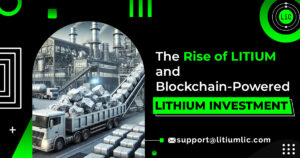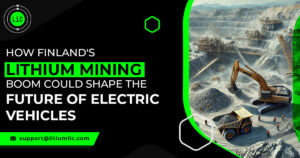The investment space is undergoing a major transformation with the increasing popularity of real-world asset-backed tokens (RWA tokens). Traditional investments, such as gold, stocks, commodities, and real estate, have always been the apparent choice for investors.
However, with technology dominating the modern investment landscape, tokenized commodities—digital assets backed by real-world commodities like gold, oil, or lithium—have emerged as stronger alternative investment options for risk-averse investors.
Among these, Litium as a tokenized asset (cryptocurrency) with its value tied to Finland-based lithium mining assets and land, offering investors direct and low-risk exposure to one of the most critical and thriving natural resources of our time. But does that mean tokenized commodities like Litium are better than traditional investments? Let’s explore tokenized commodities vs traditional investments in this article.
Traditional Investments: Safety With Limited Growth
Traditional investments, such as stocks, bonds, real estate, and physical commodities, have been the primary choice of investors for decades. These assets are easily accessible to the public and offer long-term, stable value appreciation, but they come with various challenges:
1. Market Barriers & Investment Issues
Many physical commodity investments, such as real estate or lithium mining, require large capital commitments, limiting their reach to only high net-worth individuals or institutions.
Geographic restrictions and regulatory limitations further pose challenges for retail investors to participate in physical investments in different regions.
Moreover, buying and selling certain commodities may involve complex processes and too many middlemen.
2. Liquidity Challenges
Physical commodities like gold or lithium require secure storage and maintenance, making them expensive in the long term.
Selling a traditional asset like real estate is not seamless and generally involves lengthy processes and high transaction costs.
3. Market Volatility & Centralized Control
Commodities and physical assets are subject to market volatility, driven by regulatory changes, global supply chain disruptions, inflation, and geopolitical risks.
These assets are governed by large institutions and investors who may even manipulate markets, reducing fairness and transparency for smaller investors.
These factors, among others, have contributed to the demand for alternative, more accessible, decentralized, and low-cost investment options, such as tokenized commodities.
The Rise of Tokenized Commodities: A More Efficient Investment Alternative
Tokenized commodities refer to digital assets based on blockchain technology that represent digital versions of real-world resources. These tokens usually represent ownership in an underlying physical commodity, linking their prices directly to the value of these assets. Investors and token buyers gain exposure to real-world commodities without the complexities and challenges of traditional investments.
Why Tokenized Commodities Are Gaining Traction:
1. Increased Accessibility & Fractional Ownership
Tokenization involves breaking down high-value commodities like land into smaller, tradable units, each represented by a token. Retail investors can buy tokens to own fractions of real estate such as lithium reserves, with a minimum investment of just one token.
Investors from all over the world can invest in high-value assets such as lithium mining and reserves in Finland through Litium and seamlessly track their investments and performance on the blockchain.
This type of investment doesn’t involve intermediaries, further reducing risk and costs. Investors can access and invest in global digital assets directly via blockchain.
2. Enhanced Liquidity & Transparency
Tokenized commodities have no limits. Investors can use blockchain platforms (exchanges) to buy, sell and trade their tokens 24/7 globally.
Blockchain’s immutable ledger and decentralization ensure complete transparency, reducing the risk of fraud, theft and manipulation.
3. Lower Costs & Faster Transactions
With no middlemen, crypto transactions involve nearly zero brokerage fees, management costs, and storage expenses. Tokens can be digitally stored.
Blockchain smart contracts automate transactions with high security, enabling fast payments compared to the much slower traditional commodity trading.
These are just some reasons why tokenized commodities, particularly asset-backed tokens, are gaining attention as a more feasible investment choice.
Litium: The Future of Lithium-Backed Tokenization
With the rising demand for lithium for EV batteries and storage systems, Lithium–a cryptocurrency backed by lithium mining assets in Finland–offers direct exposure to this thriving market without the challenges of traditional investments. Litium’s value is linked with lithium-rich land, making it a stable asset and reducing reliance on speculation.
Why Litium Stands Out:
✅ Backed by Physical Lithium Reserves – Unlike traditional cryptocurrencies driven by speculation, Litium gets its value from real-world lithium deposits, ensuring stability.
✅ Growth Potential with Rising Lithium Demand – The value of lithium mining assets and land will increase with a rise in global lithium demand, benefiting Litium token holders.
✅ Decentralized & Secure – Litium leverages advanced Binance Smart Chain (BSC), offering low transaction costs and fast processing speeds.
✅ Hedge Against Market Volatility – Litium’s value is tied to a real-world commodity, making it more stable than other cryptocurrencies and even some traditional assets.
✅ Accessible to All, Everywhere – By simply purchasing and holding Litium, anyone can gain exposure to Finland’s high-potential lithium mining sector.
Conclusion: The Future of Investing is Tokenized
Tokenized commodities like Litium are overtaking traditional investments by offering greater accessibility, liquidity, security, and efficiency. Unlike conventional commodities or speculative cryptocurrencies, Litium is protected against market volatility and offers direct exposure to the booming lithium industry.






